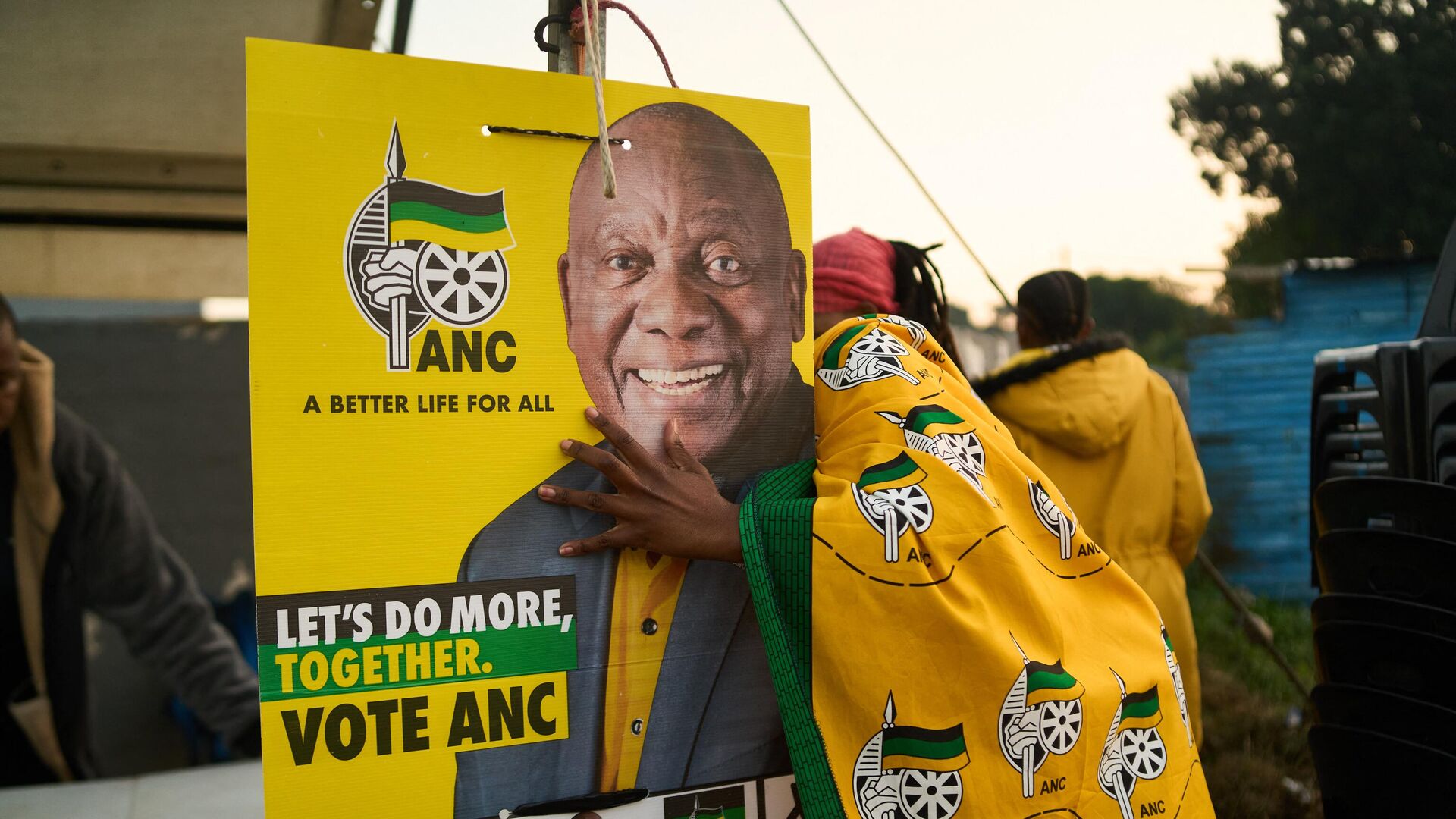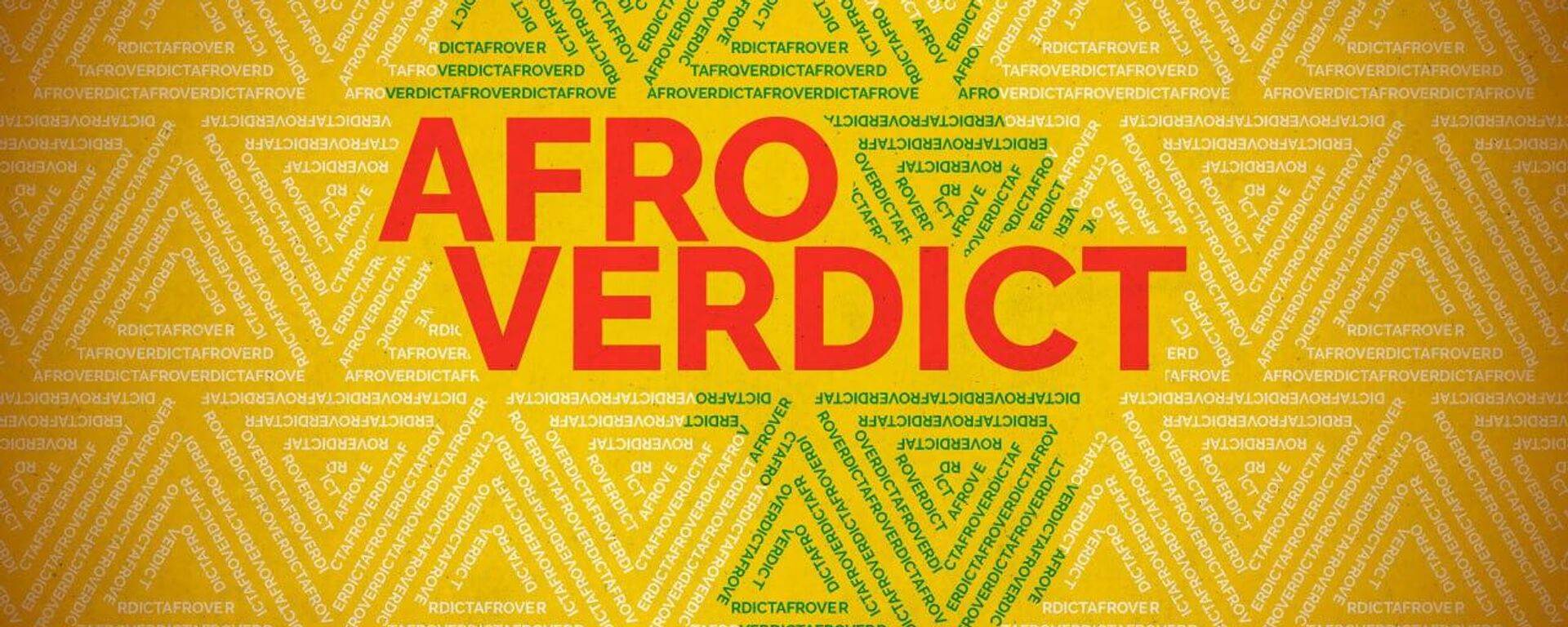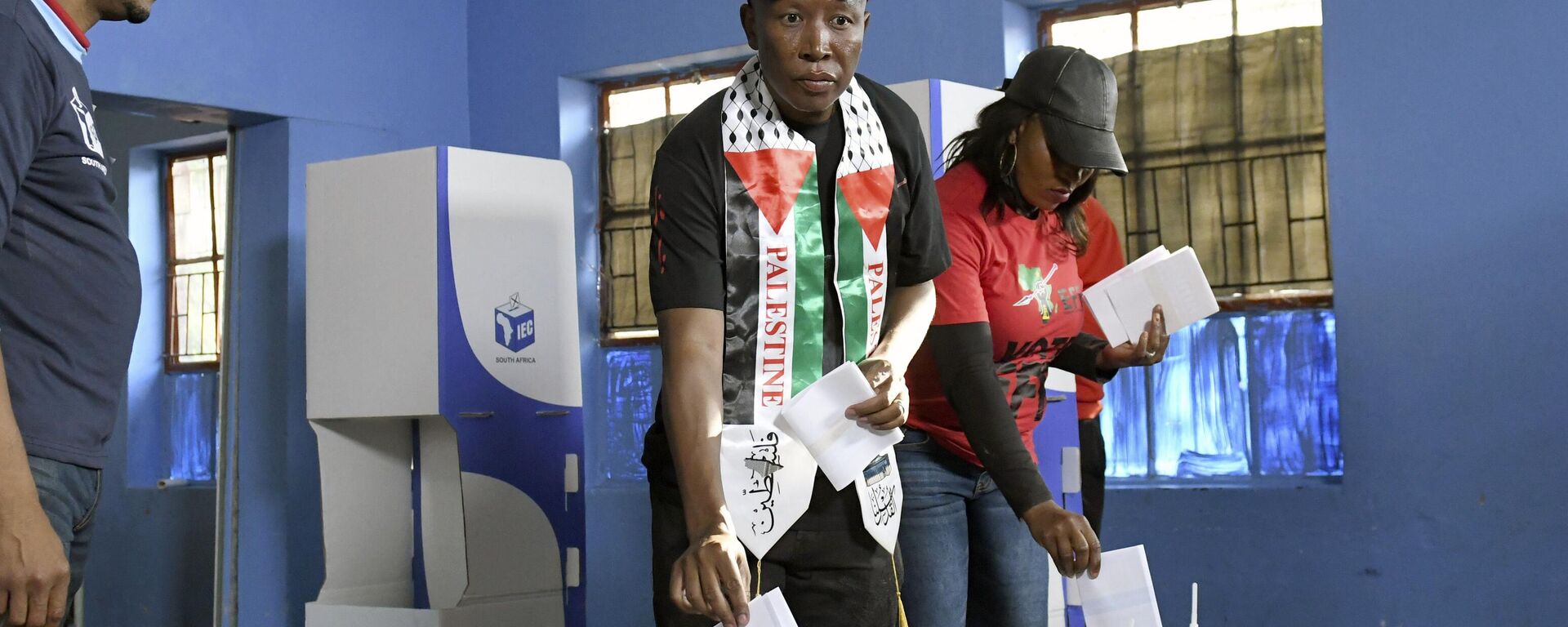https://en.sputniknews.africa/20240531/anc-a-legacy-tested-in-the-2024-south-african-general-elections-1066819330.html
ANC: A Legacy Tested in the 2024 South African General Elections
ANC: A Legacy Tested in the 2024 South African General Elections
Sputnik Africa
South Africa's general elections, the seventh since the end of the apartheid era in 1994, were held on May 29 to elect a new National Assembly and provincial... 31.05.2024, Sputnik Africa
2024-05-31T16:39+0200
2024-05-31T16:39+0200
2024-05-31T16:59+0200
sub-saharan africa
politics
nelson mandela
jacob zuma
cyril ramaphosa
south africa
african national congress (anc)
presidential election
elections
southern africa
https://cdn1.img.sputniknews.africa/img/07e8/05/1f/1066819613_0:0:3072:1728_1920x0_80_0_0_5a1a2a319b81d341f9131948d10b9d2c.jpg
The African National Congress (ANC), a party born from the struggle against apartheid, faces a pivotal moment in the 2024 general elections. While preliminary results suggest the ANC will remain the leading party, its support has dipped below 50% for the first time since 1994.According to preliminary results released by the country's National Electoral Commission as of Friday afternoon, the ANC won 41.84% of the vote, the Democratic Alliance 22.64%, the Economic Freedom Fighters 9.51%, and the newly formed uMkhonto we Sizwe (MK) 12%. The results are based on the processing of 66% of the polling stations. The turnout was 58.62%.Established in 1912 as the South African Native National Congress, the ANC has been at the forefront of South Africa's fight for racial equality.Under the leadership of figures such as Nelson Mandela, Walter Sisulu, and Oliver Tambo, the ANC has endured decades of repression, including bans, imprisonment, and exile. Yet its commitment to a democratic and just South Africa remained steadfast.Here are some key moments in the history of the ANC and its struggle for democracy and social equality in South Africa:The founders of the ANC were John Dube, Pixley Seme, Solomon Plaatje, and others.In 1923, the South African Native National Congress was renamed the African National Congress (ANC).Beginning in the 1940s, under the leadership of the young leaders of the established ANC Youth League, Walter Sisulu, Oliver Tambo, and Nelson Mandela, the party intensified action against apartheid, the official policy of racial segregation practiced in South Africa by the ruling National Party from 1948 to 1994. Initially, methods of resistance were passive: deputations, petitions, meetings. Anti-apartheid actions culminated in a 1952 campaign against the pass laws (blacks were required to carry passes indicating their employment status) and other government policies. The campaign led to the arrest and conviction of ANC leaders for treason.In 1960, the Pan Africanist Congress, which had split from the ANC in 1959, organized mass demonstrations against pass laws, during which police killed 69 unarmed demonstrators in Sharpeville. Following these events, the ANC and the Pan-Africanist Congress were banned.Deprived of legitimate opportunities for political action, the ANC went underground and began organizing outside South Africa for guerrilla warfare.In 1961, the ANC formed the militant organization Umkhonto we Sizwe (Spear of the Nation) and turned to armed action. As a result of the organization's actions, Mandela and other ANC leaders were sentenced to life imprisonment in 1964.Towards the end of the 1970s, the ANC began to revive in South Africa. The struggle against racist policies forced the government to ease the apartheid system.In 1990, President Frederik de Klerk's administration lifted the ban on the ANC, and its leaders were released from prison or allowed to return to South Africa and engage in peaceful political activity.In 1991, Nelson Mandela, the most influential of the ANC leaders, succeeded Oliver Tambo as party leader.From 1992-1993, Mandela led the ANC in negotiations with the incumbent government to transition to a government elected by universal suffrage.In April 1994, the party came to power in the country's first such election, winning 62.6% of the popular vote.On May 10, 1994, Mandela, who led a government of national unity, assumed office as South Africa's first black president.In 1996, the ANC's efforts led to the adoption of a new constitution for South Africa.Thabo Mbeki (President of South Africa 1999-2008) became the party's leader in 1997, and Jacob Zuma (President of South Africa 2009-2018) became the party's leader in 2007. In 2017, Zuma was succeeded by Cyril Ramaphosa (President of South Africa since 2018).The ANC was South Africa's dominant political force for the next five parliamentary elections; the party consistently won a majority of votes and remained the ruling party. The ANC won 66.4% of the popular vote in 1999, 69.7% in 2004, 65.9% in 2009, 62.1% in 2014, and 57.5% in 2019.As of 2022, the ANC had over 660,000 members.
https://en.sputniknews.africa/20240530/people-of-south-africa-have-spoken-south-african-analyst-on-sa-general-elections-1066808604.html
https://en.sputniknews.africa/20240530/russian-observer-claims-western-interference-in-south-african-elections-official-says-1066807868.html
south africa
southern africa
Sputnik Africa
feedback@sputniknews.com
+74956456601
MIA „Rossiya Segodnya“
2024
Muhammad Nooh Osman
https://cdn1.img.sputniknews.africa/img/07e7/04/0a/1058467512_0:0:1280:1280_100x100_80_0_0_ec723833bcbfcaed2e21952965ad99e4.jpg
Muhammad Nooh Osman
https://cdn1.img.sputniknews.africa/img/07e7/04/0a/1058467512_0:0:1280:1280_100x100_80_0_0_ec723833bcbfcaed2e21952965ad99e4.jpg
News
en_EN
Sputnik Africa
feedback@sputniknews.com
+74956456601
MIA „Rossiya Segodnya“
Sputnik Africa
feedback@sputniknews.com
+74956456601
MIA „Rossiya Segodnya“
Muhammad Nooh Osman
https://cdn1.img.sputniknews.africa/img/07e7/04/0a/1058467512_0:0:1280:1280_100x100_80_0_0_ec723833bcbfcaed2e21952965ad99e4.jpg
politics, nelson mandela, jacob zuma, cyril ramaphosa, south africa, african national congress (anc), presidential election, elections, southern africa, africa in details
politics, nelson mandela, jacob zuma, cyril ramaphosa, south africa, african national congress (anc), presidential election, elections, southern africa, africa in details
ANC: A Legacy Tested in the 2024 South African General Elections
16:39 31.05.2024 (Updated: 16:59 31.05.2024) Muhammad Nooh Osman
Writer/Editor
South Africa's general elections, the seventh since the end of the apartheid era in 1994, were held on May 29 to elect a new National Assembly and provincial legislatures in each of the nine provinces.
The African National Congress (ANC), a party born from the struggle against apartheid, faces a pivotal moment in the 2024 general elections. While preliminary results suggest the ANC will remain the leading party, its support has dipped below 50% for the first time since 1994.
According to
preliminary results released by the country's National Electoral
Commission as of Friday afternoon, the ANC won 41.84% of the vote, the Democratic Alliance 22.64%, the Economic Freedom Fighters 9.51%, and the newly formed
uMkhonto we Sizwe (MK) 12%. The results are based on the processing of 66% of the polling stations. The turnout was 58.62%.
Established in 1912 as the South African Native National Congress, the ANC has been at the forefront of South Africa's fight for racial equality.
Under the leadership of figures such as Nelson Mandela, Walter Sisulu, and Oliver Tambo, the ANC has endured decades of repression, including bans, imprisonment, and exile. Yet its commitment to a democratic and just South Africa remained steadfast.
Here are some key moments in the history of the ANC and its struggle for democracy and social equality in South Africa:
The founders of the ANC were John Dube, Pixley Seme, Solomon Plaatje, and others.
In 1923, the South African Native National Congress was renamed the African National Congress (ANC).
Beginning in the 1940s, under the leadership of the young leaders of the established ANC Youth League, Walter Sisulu, Oliver Tambo, and Nelson Mandela, the party intensified action against apartheid, the official policy of racial segregation practiced in South Africa by the ruling National Party from 1948 to 1994. Initially, methods of resistance were passive: deputations, petitions, meetings.
Anti-apartheid actions culminated in a 1952 campaign against the pass laws (blacks were required to carry passes indicating their employment status) and other government policies. The campaign led to the arrest and conviction of ANC leaders for treason.
In 1960, the Pan Africanist Congress, which had split from the ANC in 1959, organized mass demonstrations against pass laws, during which police killed 69 unarmed demonstrators in Sharpeville. Following these events, the ANC and the Pan-Africanist Congress were banned.
Deprived of legitimate opportunities for political action, the ANC went underground and began organizing outside South Africa for guerrilla warfare.
In 1961, the ANC formed the militant organization Umkhonto we Sizwe (Spear of the Nation) and turned to armed action. As a result of the organization's actions, Mandela and other ANC leaders were sentenced to life imprisonment in 1964.
Towards the end of the 1970s, the ANC began to revive in South Africa. The struggle against racist policies forced the government to ease the apartheid system.
In 1990, President Frederik de Klerk's administration lifted the ban on the ANC, and its leaders were released from prison or allowed to return to South Africa and engage in peaceful political activity.
In 1991, Nelson Mandela, the most influential of the ANC leaders, succeeded Oliver Tambo as party leader.
From 1992-1993, Mandela led the ANC in negotiations with the incumbent government to transition to a government elected by universal suffrage.
In April 1994, the party came to power in the country's first such election, winning 62.6% of the popular vote.
On May 10, 1994, Mandela, who led a government of national unity, assumed office as South Africa's first black president.
In 1996, the ANC's efforts led to the adoption of a new constitution for South Africa.
Thabo Mbeki (President of South Africa 1999-2008) became the party's leader in 1997, and Jacob Zuma (President of South Africa 2009-2018) became the party's leader in 2007. In 2017, Zuma was succeeded by
Cyril Ramaphosa (President of South Africa since 2018).
The ANC was South Africa's dominant political force for the next five parliamentary elections; the party consistently won a majority of votes and remained the ruling party. The ANC won 66.4% of the popular vote in 1999, 69.7% in 2004, 65.9% in 2009, 62.1% in 2014, and 57.5% in 2019.
As of 2022, the ANC had over 660,000 members.




